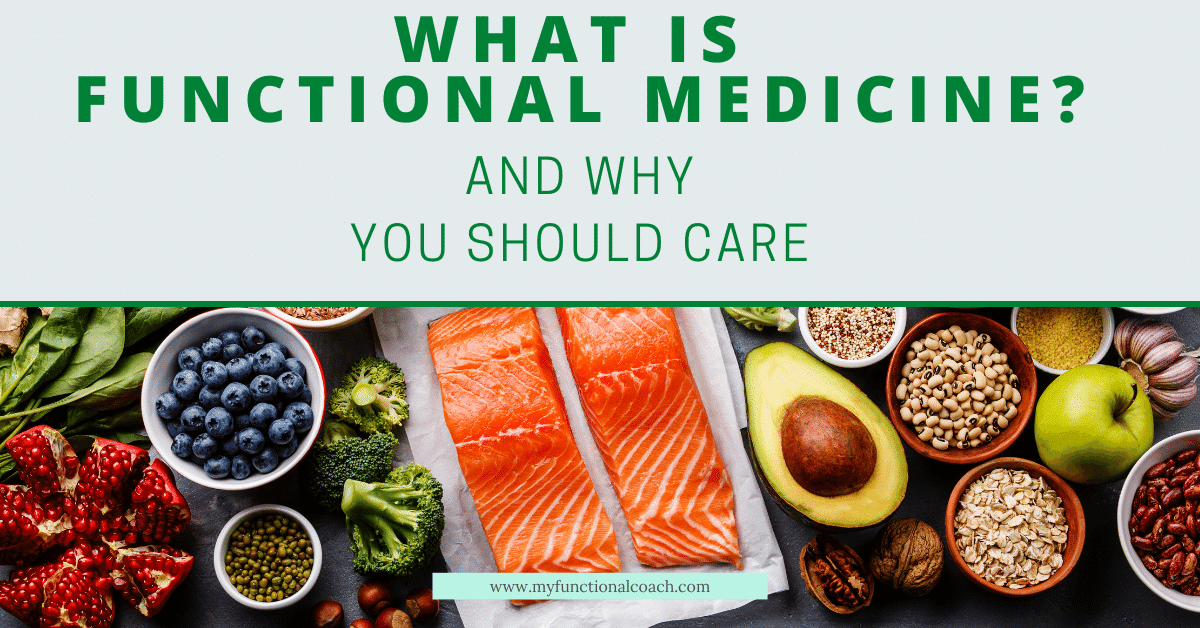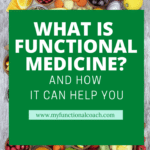The key question my friends and family ask me is “what is functional medicine?” It’s tough to explain. We can’t simplify any approach to medicine into one statement. In this post, I will try to give a thorough but simplified explanation of what functional medicine is.
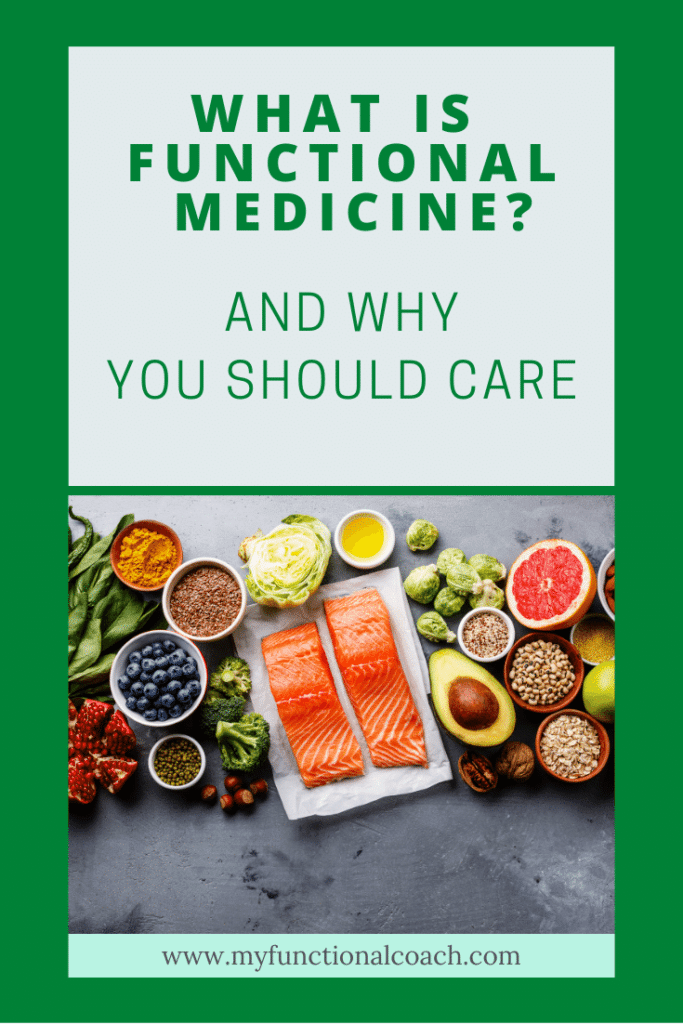
Traditional Medicine vs. Functional Medicine
Traditional medicine handles acute care situations well. However, the traditional medical approach turns out less than stellar results for chronic conditions. According to the Centers for Disease Control and Prevention, 6 out of 10 adult Americans now have at least one long-term, chronic condition such as heart disease or diabetes. 4 out of 10 have two or more chronic conditions.
Some of the lifestyle factors involved in these chronic conditions include tobacco use, poor nutrition, lack of exercise, and excessive alcohol use.
With these grim statistics, it’s understandable that more patients and physicians are searching for alternative ways to treat disease. While a traditional medical office visit often comprises finding a drug to match a disease, functional medicine addresses the root causes to maximize overall well-being.
If that sounds appealing to you, consider this fresh approach and how you might benefit in taking your health into your own hands.
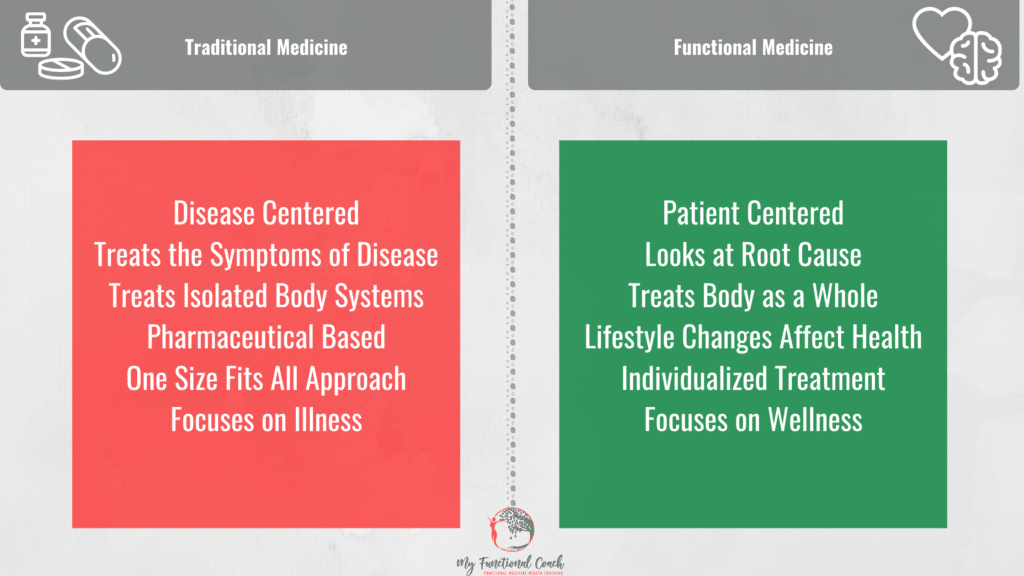
What is Functional Medicine?
Functional Medicine Defined. Functional medicine treats the whole person rather than individual symptoms. This is a systems-based approach for looking at what caused a person’s illness. It takes into account all the factors which may have played into a person’s illness. One tool used is a comprehensive timeline of a person’s health history from birth until the present moment. This type of medicine supports a collaboration between patients and their health care team. It focuses on promoting wellness rather than reducing illness.
Watch this video for an explanation of what functional medicine is.
The beginnings. Jeffrey Bland is considered the father of functional medicine. Jefferey Bland is a biochemist who co-founded the Institute for Functional Medicine in 1991. Today, over 100,000 doctors, nurses, and other health professionals specialize in functional medicine. This type of medicine has become so popular that the concept is now being introduced into the curriculum at leading medical schools.
How the medical field is spreading. The practice of functional medicine is becoming more popular. Some famous advocates include Dr. Oz, Dr. Mark Hyman, and former U.S. President Bill Clinton.
How you Can Benefit from Functional Medicine
- Better collaboration between practitioner and patient. Functional medicine encourages a partnership between doctors and patients. The practitioner actively involves the patient to help create his/her individualized health care plan.
- Change your lifestyle. Learn about how you can make lifestyle changes to improve your health. Take care of yourself by improving your sleep, exercise, and nutrition. Learn to manage your emotional stress and improve relationships.
- Learn how genetic expression impacts your health. Family history is a critical component to your well-being. Talk with your relatives to find out about potential health risks. The more proactive you are about changing your health, the better off you will be. The term epigenetics refers to the ability to turn on or off the gene expression for certain genes. While it is important to know your genetic makeup, it’s just as important to realize that you have some control over your health and whether certain genes get expressed. For a great description of epigenetics, read this article from Dr. Mark Hyman. According to this article, “You can turn on genes that create health or disease, weight gain or weight loss.”
- Empower yourself to take control of your health. Functional medicine gives hope to those suffering from chronic disease. Even if you are genetically predisposed to certain conditions, you can do a lot to ease symptoms or even prevent disease.
- Look at your environment. Are you exposed to toxic or allergenic substances that affect your health? Many substances can play havoc with your health. Learn about how you can eliminate toxins from your life.
- Understand the mind-body connection. Improving your health involves knowing how your mind is connected to your body. For example, anxiety can make you sick to your stomach or make your heart pound. This reaction puts your body under stress. Stress causes or exacerbates many illnesses.
- Be proactive. Head off trouble before it begins. Everyone can take actions to ensure better health. Wearing sunscreen protects you from skin cancer. Eating real organic foods allows you to avoid many unhealthy substances found in processed foods.
- Receive individualized care. One hallmark of functional medicine is that care is highly personalized. Lifestyle factors are taken into consideration, and a systems-based approach is used to deliver personalized care.
- Save money. If you live better and eat healthy, you might just save some money on medical expenses. You will also save money by eating homecooked meals. Many more expensive convenient restaurant foods are unhealthy choices.
- Recognize how you can make little tweaks, which may make a big difference to your health. You can improve your health by changing your diet, exercising, decreasing stress, increasing the quality of your sleep, and connecting positively with others.
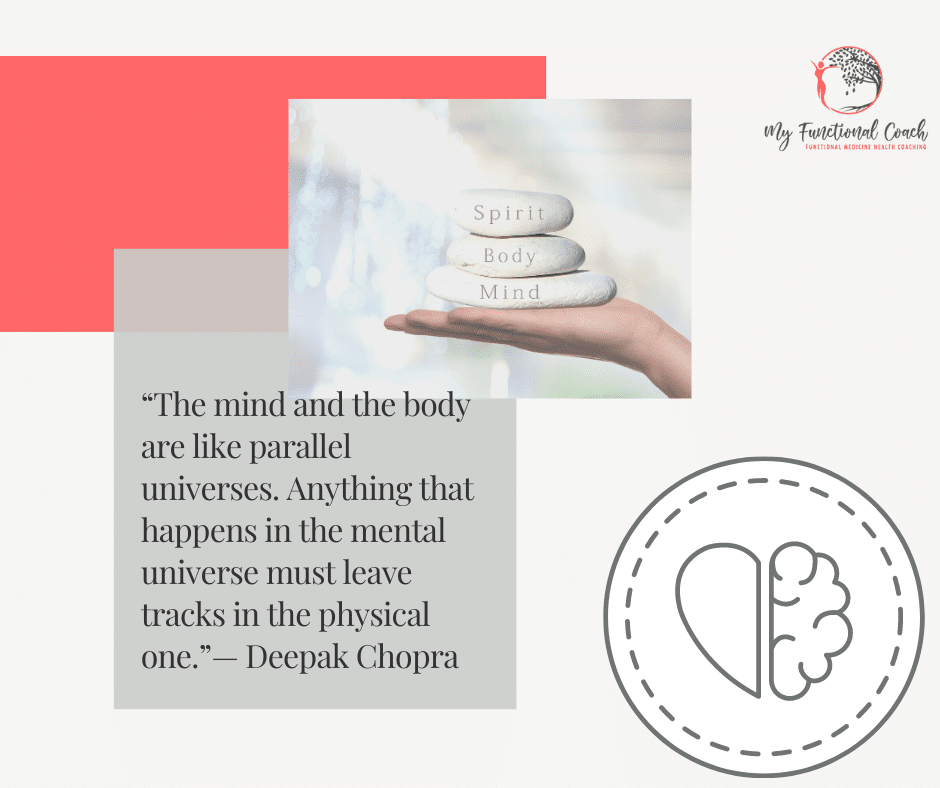
In conclusion, you can do things to enhance your long-term well-being. Make positive lifestyle changes and play an active role in your medical care. Functional medicine can help you live a longer, healthier and happier life. This dynamic approach to healthcare can transform your life.
To read why I became a functional medicine certified health coach, click here.
To get a free guide for 10 simple things you can do to break through a plateau, click below!
Disclaimer: I am not a medical doctor, therapist or Registered Dietitian. The information presented is purely for informational purposes. Check with a doctor or other medical provider before making any nutritional, fitness, or lifestyle changes. The author and blog disclaim liability for any damage, mishap, or injury that may occur from engaging in any suggestions or ideas from this site. For a full disclaimer, read this.

